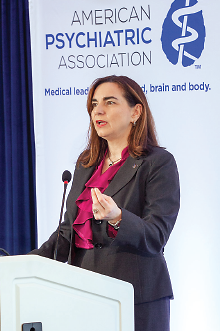APA Holds Grand Opening of New Headquarters
Abstract
APA’s new home places it in close proximity to Congress and regulatory agencies in a new neighborhood along the banks of the Potomac River.
APA officially celebrated the move to its new headquarters near the U.S. Capitol last month in Grand Opening ceremonies attended by more than 140 local and national mental health leaders, dignitaries, and staff.

From left: Washington, D.C., Mayor Muriel Bowser, APA CEO and Medical Director Saul Levin, M.D., M.P.A., and APA President Anita Everett, M.D., hold a plaque that Bowser presented during APA’s Grand Opening ceremonies in its new home last month.
APA CEO and Medical Director Saul Levin, M.D., M.P.A., APA President Anita Everett, M.D., and APA Assembly Speaker Theresa Miskimen, M.D., were among those who participated in a ribbon-cutting ceremony on March 16 in front of the new headquarters at 800 Maine Avenue, S.W., at The Wharf, Washington, D.C.’s new multi-use development on the banks of the Potomac River.
They were joined by D.C. Mayor Muriel Bowser; Monty Hoffman, founder nd CEO of PN Hoffman, the firm that conceived and developed The Wharf; and Sherry Cushman, executive managing director and leader of the Legal Sector Advisory Group, a real estate services firm.
The ribbon cutting was followed by a ceremony in the building’s penthouse meeting room in which Everett, Levin, Miskimen, Hoffman, along with D.C. Mayor Muriel Bowser and APA Foundation Executive Director Dan Gillison, delivered remarks to mark the occasion. Guests were then invited to tour APA’s offices and mingle with staff.
APA’s headquarters occupies three floors of the new building and reflects some of the latest technology and eco-friendly construction. Among its features are light-filled, eco-friendly offices; open spaces; meeting rooms; a members’ lounge; and display panels that highlight the history of psychiatry in the United States and APA.
Staff moved into the new offices on January 2 after being located in Arlington, Va., for 15 years. Before that, APA was located at 14th and K streets, N.W.,in Washington, D.C.
“APA’s new headquarters reflects both the past and the future of psychiatry,” Everett said at the penthouse ceremony. “The offices use the latest technology to help connect with and serve our members. The new headquarters also houses a rare books room and library with artifacts from the organization’s 174-year history. I urge all of our members to take the time to visit when they are in the District—this office is as much for them as for the employees of the association.”
Everett read a passage from Dr. Kirkbride and His Mental Hospital, a history of mental health treatment in the 1800s written by Earl Bond, M.D., in 1948. The book recounts the influence of Dorothea Dix and the “moral treatment” movement supported by psychiatrist Thomas S. Kirkbride and other mental health advocates who built the nation’s first asylums.
At the Jones Hospital in Philadelphia in 1844, Kirkbride and other leaders met and formed the Association of Medical Superintendents of American Institutions for the Insane, the precursor of APA. “That founding meeting happened almost 174 years ago to the day,” Everett noted.

Grand Opening guests had a chance to mingle with APA staff after the formalities were over. Here, former APA President Maria A. Oquendo, M.D., Ph.D. (left), greets Monique Stevens; with them is Debra Eubanks.
Reading from Bond’s history, Everett said, “ ‘They made a remarkable group. … These men were alive with energy, of great vitality force and abounding humanity. … Together they eagerly strove to collect the facts and use them to benefit their stricken fellow men.’ I think that is a really great description of the beginnings of our organization and reminds us of our roots.”
Levin emphasized the proximity of the new headquarters to Congress. “In our new home, APA is perfectly poised to claim its position as the psychiatric and medical leaders for care of mind, brain, and body,” he said. “Close proximity to policymakers in Congress and federal agencies, and to our partners in health care, will be extremely beneficial in advocating for our members and their patients.”
He also drew on APA’s history. “The mission of the founders of APA was to always put their patients first, to communicate their treatment advances to each other, and to collect statistical information related to mental illness and substance use,” Levin said. “Today, 174 years later, we are still following those same precepts.”
Miskimen also emphasized the importance of advocacy, recalling her visit last September to Capitol Hill with representatives from five other major medical groups to express concerns about health system reform proposals that would threaten access to care for the seriously mentally ill. “As a practicing clinician, I provide care to minority and underserved populations, including individuals with serious mental illness,” she said. “APA has guided me and supported me in advocacy for these patients.”
APA Foundation Executive Director Dan Gillison remarked that as a native Washingtonian, he could remember what The Wharf looked like four decades ago. “It is wonderful to see what it looks like today,” he said. Gillison outlined the Foundation’s programs, which include stewardship of APA’s historic artifacts and books, and he echoed others in urging members to visit the headquarters’ new rare books room.
APA Trustees initiated the search more than three years ago for a new headquarters to replace its former home in Arlington, Va. At the Board’s meeting in December 2014, Trustees approved the search for a new property after an in-depth presentation by the Board’s Ad Hoc Work Group on Real Estate. Then APA treasurer and chair of the work group, Frank Brown, M.D., summarized the options: staying in the current building, seeking another rental space, or purchasing an existing or new office space in Washington, D.C., or the surrounding area.

Assembly Speaker Theresa Miskimen, M.D., emphasizes the importance of advocating for people with mental illness in her address at the Grand Opening ceremony.
Trustees opted for the purchase of a new or existing office space in the District of Columbia, citing the importance of proximity to Capitol Hill for advocacy, the historically strong performance of real estate values in the District, and the ability to control use of space and influence the design of the property. In March 2015, Trustees voted to submit a letter of intent and initiate a due-diligence review for the purchase of the property at The Wharf. In July of that year, Trustees voted to authorize Levin to execute a lease on the new property after the lease on the property in Arlington expired, with an option to purchase the property in 2020.
The Wharf is a major development for the District of Columbia, an investment in Potomac River waterfront property that is home to America’s oldest operating fish market, but which has otherwise been largely dormant for years.
In their remarks in the ceremony after the ribbon cutting, D.C. Mayor Bowser and developer Hoffman both hailed APA for being the first business tenants to move into the new development. Bowser emphasized the multi-use nature of the project and noted that The Wharf would be home to D.C. residents of all income levels.
Hoffman said the project reconnects the city to the Potomac. “People haven’t thought of D.C. as a waterfront city even though we have 26 miles of shoreline,” he said. “We are embracing the river. There is something magical about water—it calms us. People behave differently around the water.”
He credited Levin for his early recognition of the vision behind The Wharf. “He understood that The Wharf is not about shiny new buildings; it’s about bringing people together,” Hoffman said. “To that end, APA is a great fit. ■



